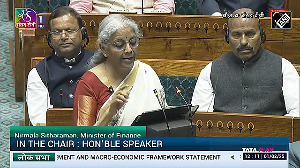What does an organisation do if it has vast amounts of space in a city and wants to be civic minded -- and to make a bit of money in the process?
Why, offer the space for parking. That's exactly what the Delhi Transport Corporation, the government-owned bus services company, is doing.
In early April this year, it began offering its 34 depots in the capital for parking in an effort to address the problem of illegal parking and to decongest traffic.
Parking vehicles at the depots offers vehicle owners the attraction of safety (cars won't be stolen), since the depots are guarded by the DTC staff, who also supervise the parking.
"The safety aspect is the biggest advantage of the DTC parking spaces," says a bank employee who parks at one of the DTC depots. The corporation expects the parking spaces at its depots to be used more effectively, when people become more aware of them.
New Delhi's parking problem is acute -- and offering parking space could be a money spinner, though the heavily losing (Rs 217 crore in losses during 2003-2004) DTC says the parking services offered at its depots are not meant to make money but are an earnest attempt at containing stray parking in the city.
"The idea is part of the DTC's social responsibility, an effort to offer alternate solutions to congestion and stray parking," says AGS Sahni, DTC chairman.
Even so, the idea does offer the DTC the potential of raising revenue. According to Mukesh Kumar, deputy commission of police (traffic), over 41,802 vehicles that were parked randomly were towed away in the first four months of this year. The fines imposed on vehicles brought the Delhi administration Rs 6,754,330.
The Rs 374 crore (Rs 3.74 billion) DTC, which earns over Rs 1 crore a day, already earns Rs 2,000 a day from parking space in its depots. It charges Rs 5 a day for parking a two-wheeler, Rs 10 for four-wheelers and Rs 30 for buses.
After several discussions with the Delhi government, it was decided that DTC depots have substantial space for parking during the day, when its city buses are out on duty.
The corporation operates a fleet of over 3,000 buses, run on compressed natural gas within the city, and 575 diesel buses on inter-state routes. The DTC, the first state transport corporation in the country to introduce CNG as fuel, has the largest CNG fleet in the world. It carries over 2.5 million commuters every day on 740 routes, covering 600,000 kilometres.
A DTC depot typically has over 500 square yards to spare for parking purposes. This space is solely for parking vehicles, apart from the parking space needed for DTC buses.
At a bus depot, 100 two-wheelers and over 25 four-wheelers can be parked. The depots are open for parking from 9 am to 8 pm. Also available for parking are DTC's 14 terminals in the city, to accommodate private buses during the night.
Most of these depots are to be found all over the city and are not limited to commercial areas where most offices are located. So the depots have a lot of locational advantages.
Yet the question is whether DTC's initiative will affect New Delhi's private parking space providers. Not so, says one. They have been offering parking services for a long time and commuters are likely to retain traditional parking places, says a private parking contractor.






 © 2025
© 2025